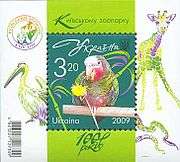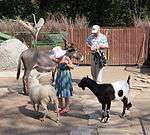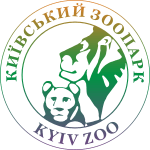Kiev Zoo
|
Kiev Zoo Logo | |
|
Kiev Zoo entry | |
| Date opened | 21 March 1909 |
|---|---|
| Location |
Kiev, |
| Coordinates | 50°27′15″N 30°27′46″E / 50.45417°N 30.46278°ECoordinates: 50°27′15″N 30°27′46″E / 50.45417°N 30.46278°E |
| Land area | 40 ha (99 acres) |
| Number of animals | 1947 (1 January 2010) |
| Number of species | 339 (1 January 2010) |
The Kiev Zoo (Ukrainian: Київський Зоопарк, Kyivskyi Zoopark) is one of the largest zoos in the former Soviet Union and the only zoo in Kiev, Ukraine. Situated on about 40 hectares (99 acres), the zoo is cared for by 378 staff members and receives about 280,000 visitors annually.
History

The Kiev Zoo was first founded in 1909 by the Nature Lovers Society and was financed by various private donations. During its first years in business, the zoo experienced some hardships and therefore, did not contain many animals, just 17 different types. During the first winter the zoo was opened, the animals had to be kept in the food storage of the main Kiev railway station, as the zoo's founders had not found a suitable shelter to keep the animals in during cold weather. Eventually, the shelter was found in the Kiev Botanical Garden. As the zoo prospered, the number of animals had increased, limiting the space available. It was reported that stray animals frightened the employees of the garden.
Only 4 years after the zoo was founded it was given a relatively large, permanent area in the outskirts of Kiev. In 1913 the animals premises received heating.
Since 1914, as the political instability in Imperial Russia tightened, the development of the zoo was held up. Only after the Russian Revolution ended did the zoo recover. During the 1940s (World War II), Kiev was occupied by the Nazi forces, and the zoo was being used by the German garrison. Fortunately, the animals were evacuated out of Kiev, and later returned after the end of the war.
In 1970 the bird's pavilion was added, which is considered to be the largest in Europe to date. In 1982, the Animals Island was presented, separated from the visitors by small canals. The Animals Island houses the zoo's large cats (like lions and tigers).
In 1996 the zoo was admitted to the European Association of Zoos and Aquaria. However, in 2007 it was expelled and banned from the association over poor conditions and mistreatment of animals.[1]
In 2008 some 51 animals died in the zoo. A series of controversial deaths also unfolded in 2010 when the 39-year-old elephant of the zoo died on April 26, followed by a camel on May 26, and a bison on May 31. The city administration and the zoo authorities blamed poisoning of the animals as cause of the deaths, while animal rights activists accused the substandard living conditions, negligent handling and unqualified zoo administration.[2][3]
In 2009 a Ukrainian postage stamp was introduced to mark the 100th anniversary of the zoo.
Description

Nowadays the zoo occupies a territory of 40 hectares. The different landscape allows the relative comfort for animals in their artificial habitat. According to CBC "the zoo has 2,600 animals from 328 species",[4] including a pair of elephants. 130 different kinds of trees and bushes decorate the zoo's islands.
The zoo is also a research centre, working on acclimatization of far land animals, preserving and reproduction of rare animals, such as the Amur tigers, bisons, Przewalski's Horses and some others.
| Group | #Species | #Specimens |
|---|---|---|
| Birds | 98 | 593 |
| Mammals | 59 | 192 |
| Reptiles | 49 | 135 |
| Amphibians | 21 | 135 |
| Fish | 58 | 530 |
| Invertebrates | 54 | 362 |
| Total: | 339 | 1947 |
References
- ↑ Clifford J. Levy: Tight Times in Ukraine Means Cramped Quarters for Its Zoo Animals, in The New York Times December 22, 2009, retrieved 14 October 2010
- ↑ Global Post: The world's worst zoos, July 23, 2010, retrieved 14 October 2010
- ↑ Andriy Kapustin:How many animals will die in Kyiv zoo? in the Kyiv Post, June 3, 2010, retrieved 17 January 2016
- ↑ Associated Press (23 March 2011). "Kiev zoo a 'concentration camp for animals'". CBC news. Retrieved 27 April 2011.
External links
| Wikimedia Commons has media related to Kiev Zoo. |
- (English) (Russian) Zoological Garden in Kiev - unofficial website
- Kiev Info - information about the zoo
- Kyiv Zoo getting ready for its 100th anniversary - The Day
- (Russian) Kyiv zoo - public project
- The story about Kyiv Zoo by the site «Photo of Kyiv, Ukraine, Europe and other world»

